

Конституции стран мира. Engadget. Spam row escalates into biggest ever cyber attack. It is being widely reported that global internet services are suffering in the fallout from a row between a spam-fighting group and a hosting firm, in the biggest cyber attack in history.

Despite numerous mainstream news sources publishing the story, many reputable technology websites are sceptical. One of them – Gizmodo – called it “a lie”. The staff at Venture Beat were a little more conservative saying the “biggest ever Internet attack is indeed huge, but it isn’t global”. The original story was that Spamhaus, a Geneva and London based group which weeds out unsolicited “spam” messages for email providers, was targeted by a Dutch web host in retaliation for being blacklisted.
Cyberbunker, which says it will host anything with the exception of child pornography or terrorism-related material, has accused Spamhaus of abusing its position, claiming it should not be allowed to decide what goes onto the internet. Will “Call of Duty” Be Assigned for 10th Grade (Gaming) Homework? Two prominent neuroscientists have published a commentary in the Feb. 28th Nature suggesting that video games might be crafted to improve brain function and enhance personal well-being.
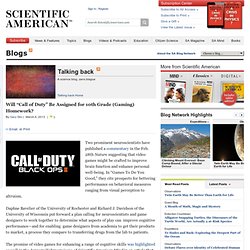
In “Games To Do You Good,” they cite prospects for bettering performance on behavioral measures ranging from visual perception to altruism. Daphne Bavelier of the University of Rochester and Richard J. Davidson of the University of Wisconsin put forward a plan calling for neuroscientists and game designers to work together to determine what aspects of play can improve cognitive performance—and for enabling game designers from academia to get their products to market, a process they compare to transferring drugs from the lab to patients. By coincidence, the same issue of Mind references one of the biggest snags in bringing forth gaming as pedagogy. What’s the answer? To continue this on-the-one-hand/other-hand thread that drives my editor crazy: something along these lines certainly seems possible. Relax! You’ll Be More Productive.
More and more of us find ourselves unable to juggle overwhelming demands and maintain a seemingly unsustainable pace.
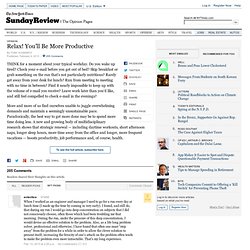
Paradoxically, the best way to get more done may be to spend more time doing less. A new and growing body of multidisciplinary research shows that strategic renewal — including daytime workouts, short afternoon naps, longer sleep hours, more time away from the office and longer, more frequent vacations — boosts productivity, job performance and, of course, health. “More, bigger, faster.” This, the ethos of the market economies since the Industrial Revolution, is grounded in a mythical and misguided assumption — that our resources are infinite. Time is the resource on which we’ve relied to get more accomplished. Although many of us can’t increase the working hours in the day, we can measurably increase our energy. In most workplaces, rewards still accrue to those who push the hardest and most continuously over time. The Stanford researcher Cheri D.
Pres.: science neuroplasticity. The Human Cognition Project (HCP) is a collaboration between Lumosity’s in-house science team and various academic scientists, clinicians, and educators interested in understanding and exploring human cognitive abilities.
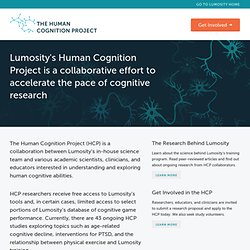
HCP researchers receive free access to Lumosity’s tools and, in certain cases, limited access to select portions of Lumosity’s database of cognitive game performance. Currently, there are 43 ongoing HCP studies exploring topics such as age-related cognitive decline, interventions for PTSD, and the relationship between physical exercise and Lumosity training. The Research Behind Lumosity Learn about the science behind Lumosity's training program. Read peer-reviewed articles and find out about ongoing research from HCP collaborators.
Learn More. Startup = Growth. September 2012 A startup is a company designed to grow fast.
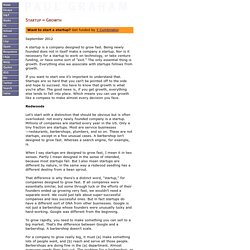
Being newly founded does not in itself make a company a startup. Nor is it necessary for a startup to work on technology, or take venture funding, or have some sort of "exit. " The only essential thing is growth. Everything else we associate with startups follows from growth. How Evernote Works Like Your Memory: An Interview with Maureen Ritchey, Cognitive Neuroscientist. Evernote is designed to work the way your brain does and a few months ago, a neuroscientist named Maureen Ritchey came by our offices to explain exactly why that’s the case.
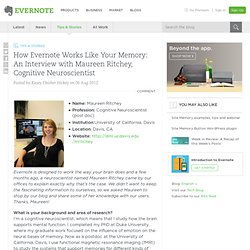
We didn’t want to keep the fascinating information to ourselves, so we asked Maureen to stop by our blog and share some of her knowledge with our users. Thanks, Maureen! What is your background and area of research? I’m a cognitive neuroscientist, which means that I study how the brain supports mental function. I completed my PhD at Duke University, where my graduate work focused on the influence of emotion on the neural bases of memory. How do our brains retrieve memories? Why are some memories easier to recall than others?
Requirement. In , a requirement is a singular documented need of what a particular product or service should be or do.
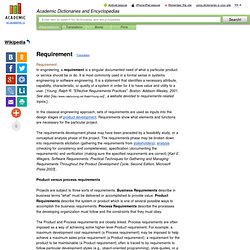
It is most commonly used in a formal sense in or . It is a statement that identifies a necessary attribute, capability, characteristic, or quality of a system in order for it to have value and utility to a user. [Young, Ralph R. "Effective Requirements Practices". Boston: Addison-Wesley, 2001.